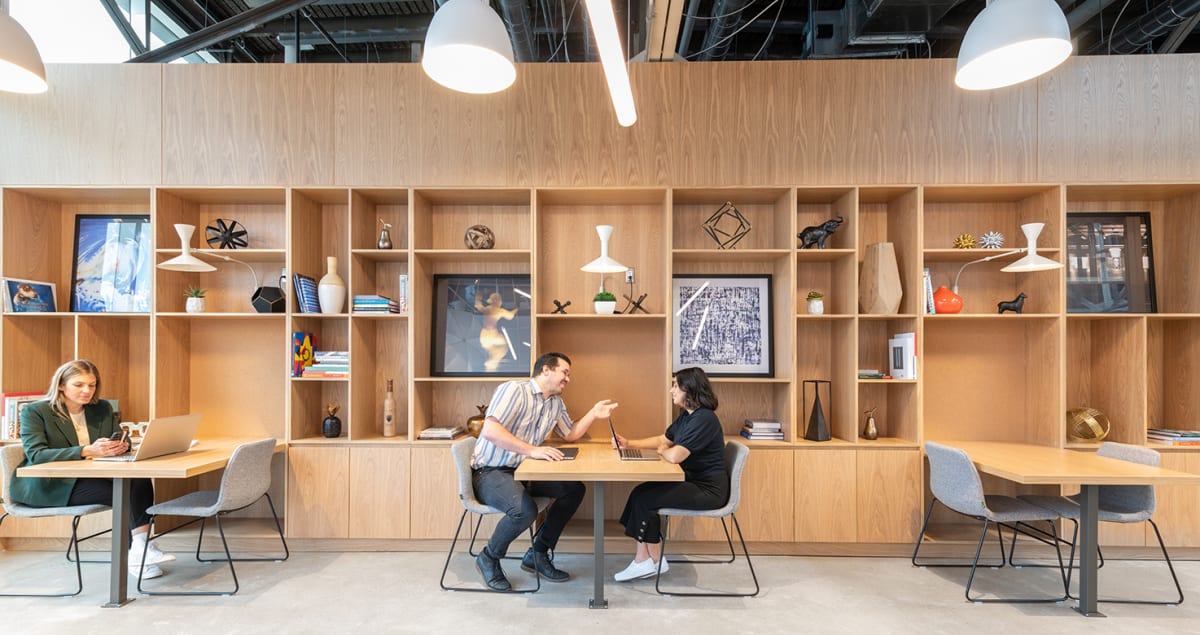As the hybrid working trend continues to accelerate, flexspace will inevitably form a part of many companies’ real estate portfolios.
Last year, as the great ‘work from home’ experiment took hold, many companies around the world chose to close offices and allow leases to expire. According to a survey by KPMG, last August 69% of chief executives from 500 firms with sales of more than $500m were planning to cut back on office space.
Recognising the benefits early on, multinational companies Standard Chartered bank and NTT both signed flexible workspace deals with IWG during the first half of 2021.
Today, the focus will be on optimising the hybrid working model, which will see employees ‘working from anywhere’ – often using a combination of flexspace, offices and homes as bases.
Here are five reasons why flexspace will play a key role in clients’ real estate portfolios, going forward.
1. Office downsizing
As increasing numbers of companies recognise the benefits of embracing a ‘hub-and-spoke’ model for working – which sees dedicated HQs functioning as ‘hubs’ and homes and coworking spaces functioning as ‘spokes’ – reduced office capacity has become the norm. At the same time, government imperatives to work at home are being relaxed and employers are encouraging employees to show their face in an office at least a couple of days a week, for example.
As clients redesign their operating structures, there is an opportunity for brokers to highlight the benefits of flexspace as a way to bridge the gap and give teams a professional work environment without the commitment of an expensive office (or network of offices).
2. Flexibility as standard
This autumn, the UK government is expected to announce a new policy that means millions of employees across the country will be given a ‘day one’ right to request that their employer allows them to work flexibly as soon as they are hired. It will mean people are able to choose the days, hours and location they work.
This is a massive shift away from ‘presenteeism’, which up until early 2021 was the dominant force in UK company culture. Now that the focus has shifted towards productivity, employers are far more willing to trust people to work from remote locations such as coworking spaces.
3. Increased profit margins
After a tough 18 months for many businesses, not having to pay for office leases will be a good way of moving them towards a healthier financial status and reducing overheads. Although coworking subscriptions require some outlay, they are certainly cheaper than large, long-term dedicated HQs. These incur costly furnishing and IT infrastructure bills, as well as other ongoing expenses, such as insurance, cleaning, electricity and heating.
For companies downsizing their main offices in favour of giving employees access to local flexspace, there are significant savings to be made.
4. Attracting new talent
Over the spring and summer of 2021, millions of people have been leaving their jobs, and HR managers are finding it tougher than ever to fill vacant roles. In the US, four million people left their jobs in April and, in the UK, according to the Office of National Statistics, there were almost a million job vacancies in July (the most ever).
The ‘Great Resignation’ (as it has been called) means companies are having to work harder than ever to win new talent, and that means providing access to attractive work environments in convenient locations such as outside cities, nearer to where people actually live. Giving recruits the opportunity to base themselves at a neighbourhood flexspace rather than asking them to commute to a central office will be a major selling point.
5. Building in agility
If there is one thing the pandemic has taught companies, it’s the importance of agility. Preparing for uncertainty is a key way to future-proof businesses against unforeseen events. Creating structures that allow for organisations to shrink and grow in size in line with their employee pool and financial liquidity, will also be part of the strategy. For business leaders, flexspace provides the perfect solution: office space can easily and quickly be scaled up or down according to need.
Altogether, it seems clear that - when it comes to hybrid working and the importance of flexspace in businesses’ real estate portfolios - a new era has begun. For companies and the brokers who advise them, there is much to be gained from embracing the change.
An industry leader for more than 30 years, IWG is helping both brokers and businesses find the flexspace solutions they need in this new world of work.






